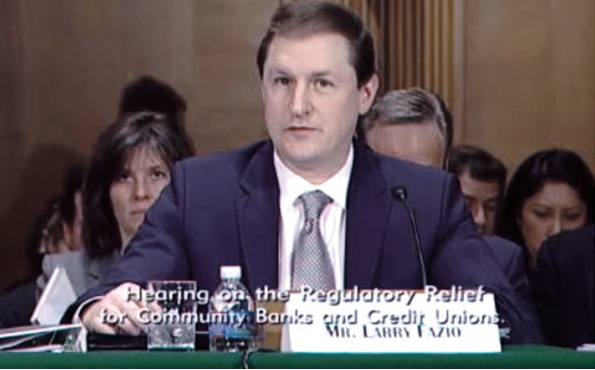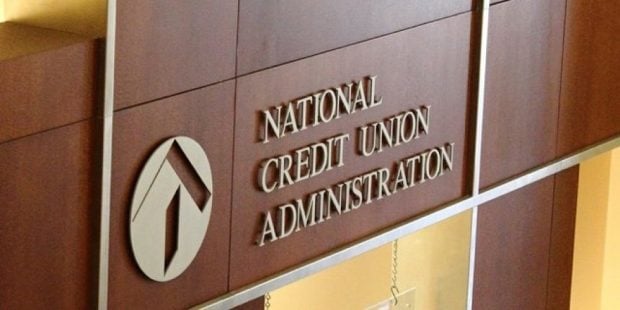
Larry Fazio, NCUA director of examination and insurance, (pictured on left) talked FOM, MBLs, and supplemental capital at a Feb. 10 hearing before the Senate Banking Committee.
WASHINGTON — The NCUA Board will consider raising the definition of a small credit union from assets less than $50 million to assets less than $100 million, an NCUA official announced before a Feb. 10 congressional hearing.
Recommended For You
Larry Fazio, NCUA director of examination and insurance, also requested member business lending, supplemental capital and field of membership changes at a Senate Banking Committee hearing on regulatory relief for community banks and credit unions. He told lawmakers the NCUA wants the authority to examine and enforce corrective actions at third-party vendors, comparable to the powers of the FDIC, Office of the Comptroller of the Currency, and the Federal Reserve. Officials from all three agencies also testified.
A proposed rule on redefining small credit unions will be introduced at the Feb. 19 NCUA board meeting. The regulator estimated that the increased threshold would provide an additional 745 credit unions with special consideration for regulatory relief in future rulemakings.
"Should the board adopt a $100 million threshold, 77% of all credit unions would be covered in future considerations of regulatory relief," Fazio's written testimony read. "Taking this action also would recognize the challenges encountered by credit unions below $100 million in assets, which have slower deposit growth rates, slower membership growth rates, and higher operating costs than peer credit unions above the threshold."
CUNA Deputy General Counsel Mary Dunn said the NCUA is placing too much emphasis on smaller credit unions.
"Of course they need regulatory relief, nobody would say otherwise, but all credit unions of all sizes need regulatory relief so it's really focusing on every size credit union, not just one particular size," she said.
Carrie Hunt, NAFCU SVP of government affairs and general counsel, called the asset thresholds arbitrary.
"Regulatory relief should be looked at for all credit unions, regardless of size," she said.
Fazio asked Congress to allow healthy and well-managed credit unions to issue supplemental capital that will count as net worth. According to the NCUA, most federal credit unions can only raise capital through retained earnings, which limits their ability to expand into fields of membership more effectively and to offer better options to eligible consumers.
Fazio also called on Congress to raise the cap on member business lending to support small businesses. The Federal Credit Union Act limits MBLs to 12.25% of assets or 1.75 times net worth, unless the credit union qualifies for a statutory exemption.
CUNA and NAFCU commended Fazio for raising positive regulatory reforms in his testimony but said he left out some key issues.
"Any time regulators are talking about regulatory relief, it's positive, but the real measure of relief is if credit unions feel the burden has lightened. I don't think any credit union feels that today," Dunn said, referencing Fazio's comments at the hearing.
Dunn said Fazio failed to mention pending changes to call reports as part of the revised proposed risk-based capital rule.
"When the rule takes effect, they've [NCUA] already said there's going to be a whole lot of call report items added so we should be thinking now about the burden of the call report changes for risk-based capital and other areas," she said.
Changes to the examination process also remained a top regulatory priority for CUNA. Dunn claimed many have complained about large groups of examiners at their credit unions. Cooperatives of all sizes have told the trade group about examiners who said they did not have much to do while on site.
"We definitely think NCUA should be considering more ways to improve examinations that would maximize the ability of credit unions to operate without examiner micromanagement when there isn't a safety and soundness problem," Dunn said.
Hunt said NAFCU fundamentally disagrees with the NCUA on how much risk there is in the system. "Ultimately, that's where the vast majority of regulatory relief needs to take place, like the risk-based capital proposal. We don't think we need it. We don't think NCUA has proven their case as to why they need it," she said. "This hearing was about regulatory relief and NCUA said, 'oh, by the way, we need third-party vendor authority.' They haven't proven their case on that either," Hunt said.
In addition, Fazio asked the committee to consider allowing federalcredit unions that have a community or single common-bond charter the opportunity to add underserved areas. He argued that the field of membership change would open up access for many more unbanked and underbanked households.
"This legislative change could also eventually enable more credit unions to participate in the programs offered through the congressionally established Community Development Financial Institutions Fund, thus increasing the availability of credit and savings options in distressed areas," Fazio's written testimony read.
He also recommended that Congress allow federal credit unions to serve underserved areas without requiring those areas to be local communities.
"NCUA stands ready to work with the committee on these ideas as well as other options for adjusting field of membership requirements," Fazio wrote.
CUNA and NAFCU said they support Fazio's field of membership initiatives.
"Congress can provide field-of-membership relief by removing outdated restrictions that credit unions face such as expanding the criteria for defining urban and rural and allowing voluntary mergers involving multiple common bond credit unions and allowing credit unions that convert to community charters to retain their current select employee groups," Hunt said.
Prior to CUNA's Governmental Affairs Conference in March, Dunn said the trade group plans to provide the NCUA with more changes to consider.
"Credit unions should look for every opportunity to work in concert with the bankers to get reg relief items that benefit both industries; that's a practical and realistic approach," John McKechnie, partner at Washington-based consulting firm Total Spectrum, said.
"At the same time credit unions must also realize that there are some issues of critical importance, like supplemental capital, that the bank lobby seems stridently opposed to," he added. "That can't mean we abandon the pursuit of a bill. It does mean we have to redouble our efforts to persuade Congress to pass credit union provisions because it will be good for consumers. It's the right thing to do."
© 2025 ALM Global, LLC, All Rights Reserved. Request academic re-use from www.copyright.com. All other uses, submit a request to [email protected]. For more information visit Asset & Logo Licensing.







